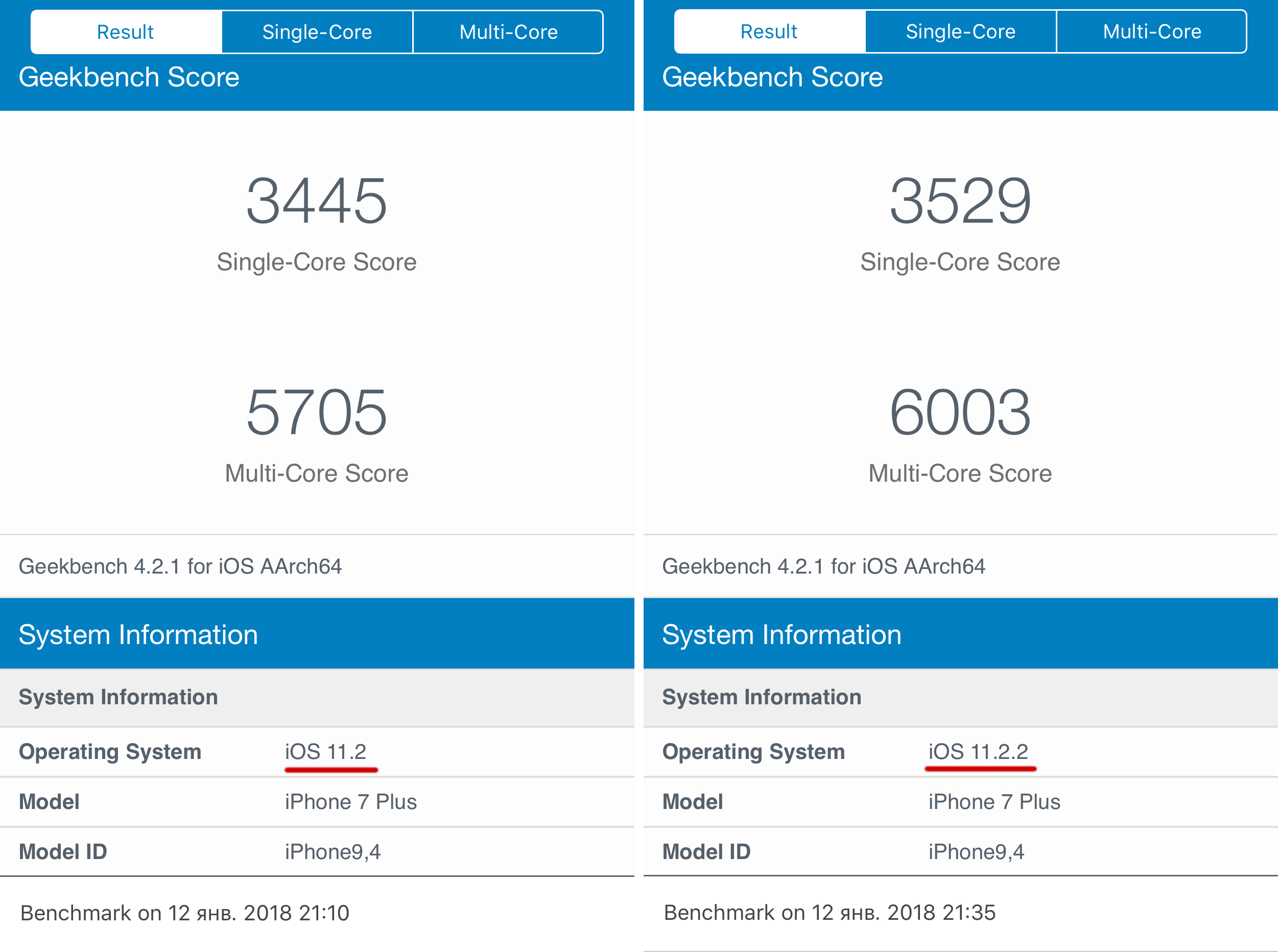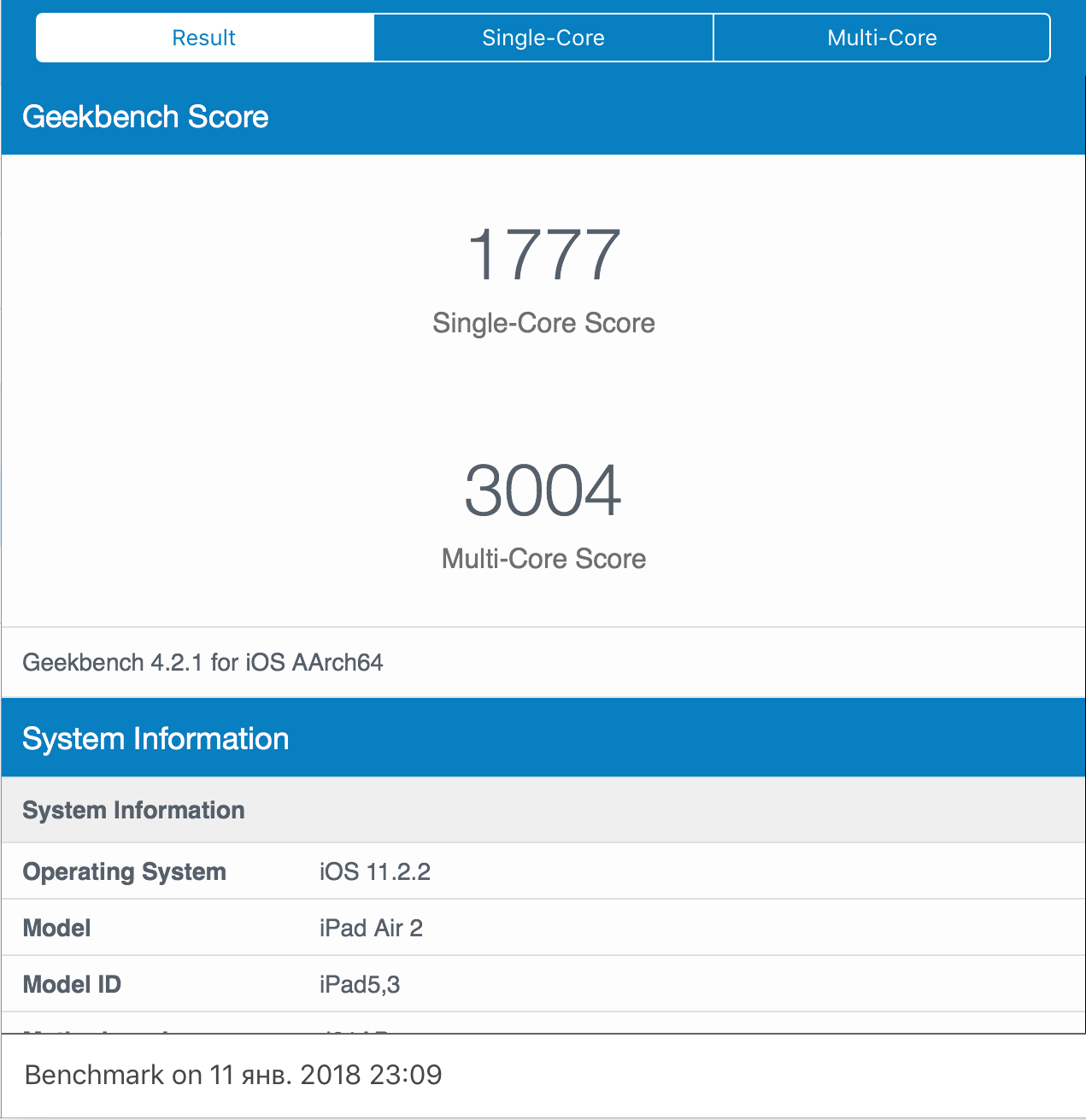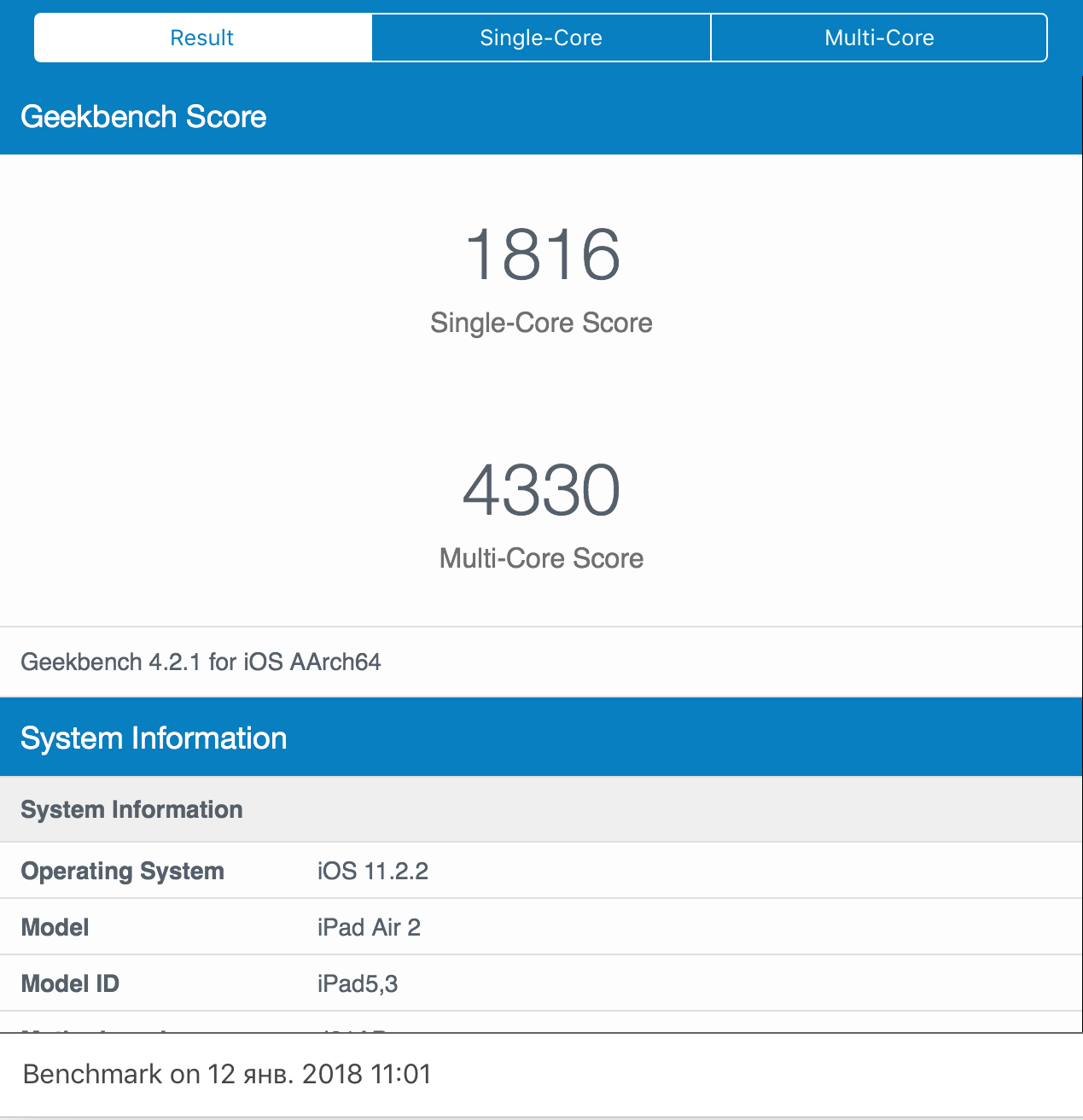Patch against Specter in iOS 11.2.2 slows devices by 50%?
Materials with similar high-profile headlines have been widely disseminated by numerous technoblogs, using the article “iPhone performance benchmarks after Specter security update” as the source of the authorship of hitherto unknown blogger Melv1n (Melvin Mughal). The bottom line is simple: Apple rolled out a patch designed to close the Specter vulnerability in iOS; after installing it, the benchmark showed a significant decrease in the performance of iPhone 6. The link to the post was posted on one of the major resources, Melvin’s small standalone blog crashed under the “habraffect”, and the Internet audience began discussing another horror story and stigmatizing Apple. Well, what about the patch and performance?
To verify Melvin’s statement, it’s enough to conduct a simple experiment using the method described in the post: take measurements in the Geekbench 4 benchmark before installing the update and after it on the device without jailbreak, closing all running applications.
iPhone 7 Plus demonstrates a clear (albeit small) increase in productivity (or, rather, an account in the benchmark) immediately after updating iOS from 11.2 to 11.2.2: "parrots" before the update , after the update , direct comparison (my results).

Similar reports from users of the iPhone 6s / 7/8 (Plus), X, and even 5s are regularly found in comments on similar articles: points in Geekbench increased slightly. But maybe the problem affected only the Apple A8 SoC used in the iPhone 6?
I don’t have a sixth iPhone, but I have an iPad Air 2 - it uses the tri-core version A8, A8x. Unfortunately, I forgot to measure it in parrots before the update, so we will focus on the average values from the Geekbench website : 1796 points in the test on one core and 4161 in the multi-core mode. Running the benchmark immediately after installing iOS 11.2.2 showed sad results:

Is Melvin right? The result in single-core is acceptable, but where did a good thousand points go in multi-core?
I was embarrassed that after the update the iPad was warm (not hot, but not quite cold). I repeated the measurement the next day and got completely normal results (slightly above average):

Obviously, some background processes started on the device after the update, most likely - storage optimization, indexing, etc., due to which the performance temporarily decreased. I came across a similar one both on apple devices and on Android smartphones, which could even get very hot in the first hours after the update, performed without a wipe (full cleaning) of user files.
It is not known whether it is a coincidence that the iPhone 7 Plus on the SoC A10 showed normal (or even higher) scores just minutes after installing the patch, and the iPad Air 2 (and, obviously, Melvin Mughal’s iPhone 6) launched on A8 (x) which optimization processes that temporarily reduce productivity. I am almost sure that this feature has nothing to do with Specter protection, most likely just “cleaning up” the system.
Bottom line: both tested devices did not demonstrate at least any significant and (or) persistent degradation of performance after installing iOS 11.2.2. Unfortunately, large portals with millions of visits, with many devices for tests and reviews, do not bother to perform simple material checks if there is a chance to collect more traffic on a resonant topic. Update boldly - at least if you are already on iOS 11 and are not using jailbreak.
To verify Melvin’s statement, it’s enough to conduct a simple experiment using the method described in the post: take measurements in the Geekbench 4 benchmark before installing the update and after it on the device without jailbreak, closing all running applications.
iPhone 7 Plus demonstrates a clear (albeit small) increase in productivity (or, rather, an account in the benchmark) immediately after updating iOS from 11.2 to 11.2.2: "parrots" before the update , after the update , direct comparison (my results).

Similar reports from users of the iPhone 6s / 7/8 (Plus), X, and even 5s are regularly found in comments on similar articles: points in Geekbench increased slightly. But maybe the problem affected only the Apple A8 SoC used in the iPhone 6?
I don’t have a sixth iPhone, but I have an iPad Air 2 - it uses the tri-core version A8, A8x. Unfortunately, I forgot to measure it in parrots before the update, so we will focus on the average values from the Geekbench website : 1796 points in the test on one core and 4161 in the multi-core mode. Running the benchmark immediately after installing iOS 11.2.2 showed sad results:

Is Melvin right? The result in single-core is acceptable, but where did a good thousand points go in multi-core?
I was embarrassed that after the update the iPad was warm (not hot, but not quite cold). I repeated the measurement the next day and got completely normal results (slightly above average):

Obviously, some background processes started on the device after the update, most likely - storage optimization, indexing, etc., due to which the performance temporarily decreased. I came across a similar one both on apple devices and on Android smartphones, which could even get very hot in the first hours after the update, performed without a wipe (full cleaning) of user files.
It is not known whether it is a coincidence that the iPhone 7 Plus on the SoC A10 showed normal (or even higher) scores just minutes after installing the patch, and the iPad Air 2 (and, obviously, Melvin Mughal’s iPhone 6) launched on A8 (x) which optimization processes that temporarily reduce productivity. I am almost sure that this feature has nothing to do with Specter protection, most likely just “cleaning up” the system.
Bottom line: both tested devices did not demonstrate at least any significant and (or) persistent degradation of performance after installing iOS 11.2.2. Unfortunately, large portals with millions of visits, with many devices for tests and reviews, do not bother to perform simple material checks if there is a chance to collect more traffic on a resonant topic. Update boldly - at least if you are already on iOS 11 and are not using jailbreak.
